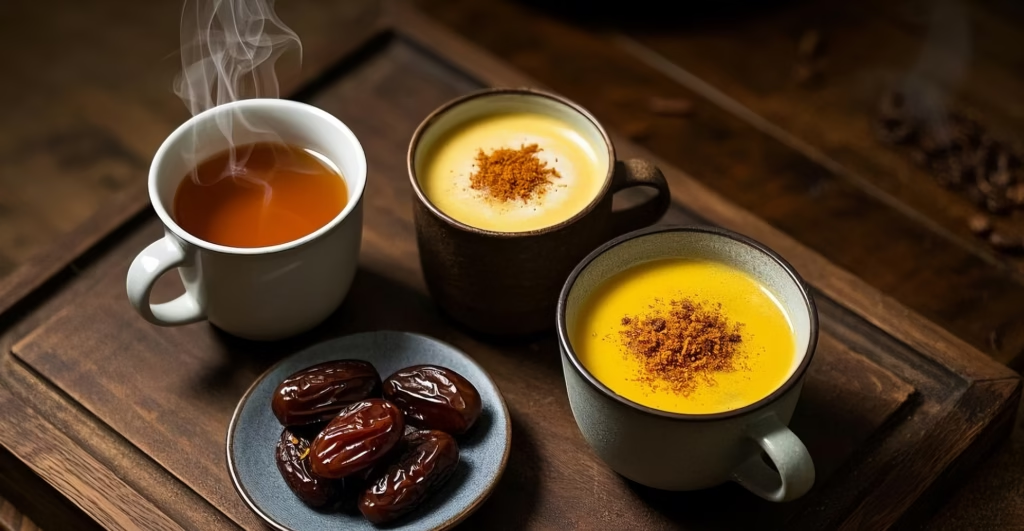Coffee Substitutes During Fasting: 5 Refreshing Energy-Boosting Beverages

Hey Brewmates! Struggling with the idea of giving up your morning coffee ritual during fasting month? Trust me, I feel your pain. That steaming cup of java isn’t just about the caffeine hit—it’s a whole vibe, a morning ceremony we coffee lovers live for. But let’s get real: caffeine during fasting can be a recipe for dehydration, jitters, and that dreaded afternoon crash when your energy is already at rock bottom.
The good news? You don’t have to suffer through fasting without your comforting cup of something warm and energizing. We’ve rounded up some seriously good coffee substitutes during fasting that’ll keep your energy steady without the caffeine rollercoaster. Whether you’re fasting for Ramadan, intermittent fasting, or other spiritual practices, these alternatives have got your back. Some of these can even work well as beverages for suhoor to help you stay energized throughout your fasting day.
Quick Facts
• Caffeine has a half-life of 5-6 hours, meaning consuming it too close to fasting can lead to withdrawal headaches during your fast
• Gradually switching to alternatives 7-10 days before fasting begins helps minimize withdrawal symptoms
• Reducing caffeine during fasting periods can improve sleep quality, stabilize energy levels, and decrease dehydration by up to 30%, according to recent hydration studies
Herbal-Based Beverages

Chicory Root Coffee
If you’re looking for the closest taste experience to coffee, chicory root should be your first stop on this journey. This amazing root has been used as a sustainable coffee alternative for centuries, especially during times of coffee shortages. What makes it special? When roasted and ground, chicory root creates a remarkably coffee-like brew with that deep, slightly bitter flavor profile coffee lovers crave.
The best part? Chicory is completely caffeine-free while still offering a satisfying richness that feels like you’re indulging in your regular coffee routine. It contains inulin, a prebiotic fiber that supports digestive health—an added bonus when your digestive system might already be adjusting to fasting schedules.
Brewmates can easily find premade chicory coffee blends or pure chicory products online and in health food stores. Some popular brands even mix chicory with other coffee-complementing ingredients like dandelion root, carob, or roasted barley for an even more complex flavor profile.
Dandelion Root Tea
Don’t let its reputation as a pesky garden weed fool you—dandelion root makes an exceptional coffee substitute during fasting. With its earthy, slightly bitter taste and rich amber color, dandelion root tea delivers a satisfying experience that can help ease the transition away from coffee.
What makes dandelion root particularly valuable during fasting is its traditional use as a gentle liver detoxifier and digestive aid. The root contains natural compounds that support the body’s detoxification processes—something particularly beneficial during fasting periods when your body is already in cleansing mode.
Dandelion root tea can be found in most health food stores and online retailers, either as a standalone product or in detox tea blends. For the best flavor experience, look for roasted dandelion root, which offers a deeper, more coffee-like taste profile that will satisfy your coffee cravings without the caffeine jitters.
Golden Milk
Golden milk, or turmeric latte as it’s sometimes called, offers a completely different flavor profile from coffee but delivers impressive benefits that make it an excellent coffee substitute during fasting. This vibrant yellow beverage combines warming turmeric with other spices like cinnamon, ginger, and black pepper, typically mixed with a plant-based milk.
The star ingredient—turmeric—contains curcumin, a compound with powerful anti-inflammatory properties. During fasting, when your body might be more sensitive to inflammation, this soothing drink can help maintain comfort while also providing a gentle energy boost without caffeine.
Brewmates might appreciate that golden milk can be enjoyed either hot or cold, making it versatile throughout the day. The combination of spices creates a complex flavor experience that gives your palate something interesting to focus on—helping to overcome the psychological aspect of missing your coffee ritual.
Natural Energy Drinks

Matcha Latte
For those who still want a gentle energy lift without coffee’s intense caffeine hit, matcha offers the perfect middle ground as a coffee substitute during fasting. This finely ground green tea powder contains about one-third the caffeine of coffee but delivers it in a slow-release form thanks to the amino acid L-theanine.
The result? A calm, focused energy that lasts for hours without the crash—ideal when you’re already managing energy levels during fasting. The L-theanine in matcha promotes alpha wave activity in the brain, creating a state of relaxed alertness rather than the jittery stimulation coffee often provides.
Prepare matcha by whisking the vibrant green powder with hot (not boiling) water, then adding warmed milk of your choice. The earthy, slightly sweet flavor profile offers a sophisticated alternative to coffee that feels equally special and ritualistic—an important psychological component when replacing a beloved coffee habit.
Carob Drink
If you’re missing the rich, slightly bitter notes of coffee, carob makes an excellent coffee substitute during fasting. This pod from the carob tree can be roasted and ground similar to coffee beans, creating a naturally sweet, chocolatey beverage without any caffeine.
Unlike coffee, carob is alkaline rather than acidic, making it gentler on the stomach—particularly beneficial during fasting when your digestive system might be more sensitive. Its natural sweetness means you can enjoy it without added sugars, helping maintain stable blood sugar levels throughout your fast.
Brewmates can prepare carob powder similar to hot chocolate—mixed with hot milk or a plant-based alternative and perhaps a touch of cinnamon or vanilla for extra flavor depth. The resulting beverage offers comfort and warmth without interfering with your fasting benefits.
Maca Root Beverage
For a truly energizing coffee substitute during fasting, consider maca root powder. This Peruvian superfood has been used for centuries to enhance stamina, energy, and mental clarity—all without caffeine or stimulants.
Maca works as an adaptogen, helping your body manage stress and maintain energy balance even during challenging periods like fasting. Its malty, earthy flavor with hints of butterscotch makes it a unique but satisfying alternative to your morning brew.
To prepare, simply blend 1-2 teaspoons of maca powder into warm milk, smoothies, or even water. The subtle sweetness means many Brewmates enjoy it without additional sweeteners, though a touch of honey or maple syrup can enhance its natural caramel-like notes if consumed during non-fasting hours.
Tips for Transitioning from Coffee

Making the switch from coffee to alternatives requires strategy, especially when preparing for fasting. Start reducing your coffee intake gradually, about 1-2 weeks before fasting begins. Replace one cup every few days with one of the alternatives mentioned above, allowing your body to adjust slowly.
Hydration plays a crucial role when managing caffeine withdrawal. During non-fasting hours, drink plenty of water, herbal teas, and electrolyte-rich beverages to minimize headaches and fatigue. Remember that the most intense withdrawal symptoms typically peak around 24-48 hours after reducing caffeine and generally subside within a week.
Consider timing your transition to align with your schedule. Begin on a weekend or when you have fewer demands, allowing yourself space to manage any temporary discomfort. This mindful approach makes adapting to coffee substitutes during fasting much more sustainable.
Tips for Managing Coffee Cravings During Fasting
To successfully embrace coffee substitutes during fasting, create a new morning ritual that feels special. Use your favorite mug, take time to properly prepare your alternative beverage, and perhaps add a moment of mindfulness or gratitude while enjoying it—these psychological associations help strengthen your new habit.
Keep your body energized naturally by prioritizing nutrient-dense meals during non-fasting hours. Foods rich in B vitamins, magnesium, and protein provide sustainable energy without caffeine. During allowed eating periods, include plenty of whole grains, nuts, seeds, and leafy greens to support optimal energy levels throughout your fast.
For those experiencing caffeine withdrawal headaches, try gentle temple massage, stay well-hydrated during eating periods, and consider a small amount of natural electrolytes like coconut water when breaking your fast. Remember that withdrawal symptoms are temporary, while the benefits of reducing caffeine dependency are long-lasting.
Conclusion
Finding the right coffee substitutes during fasting doesn’t mean sacrificing your enjoyable ritual or giving up on flavorful, energizing beverages. By exploring these alternatives—from chicory and dandelion root to golden milk, matcha, carob, and maca—you’re not just surviving without coffee but potentially discovering new favorites that better support your health during fasting periods.
The transition might take some adjustment, but many Brewmates find they actually prefer these gentler alternatives once they’ve broken the caffeine dependency cycle. Your body will thank you with more stable energy, better hydration, and potentially even improved fasting results. Which of these coffee substitutes will you try first? We’d love to hear about your experience!

 Business Stories
Business Stories Coffee World
Coffee World Drink Discoveries
Drink Discoveries Tea Stories
Tea Stories







